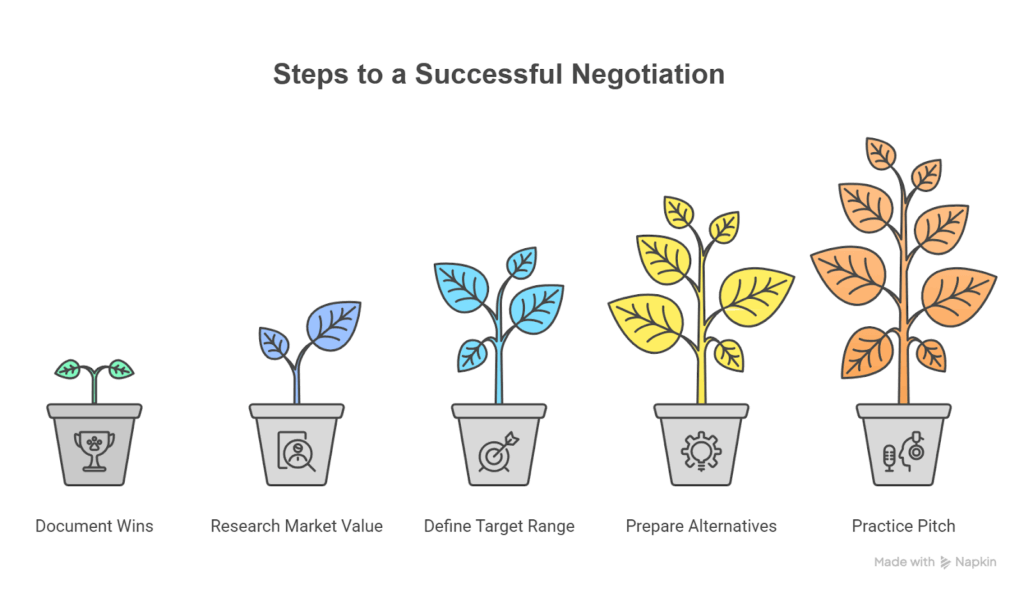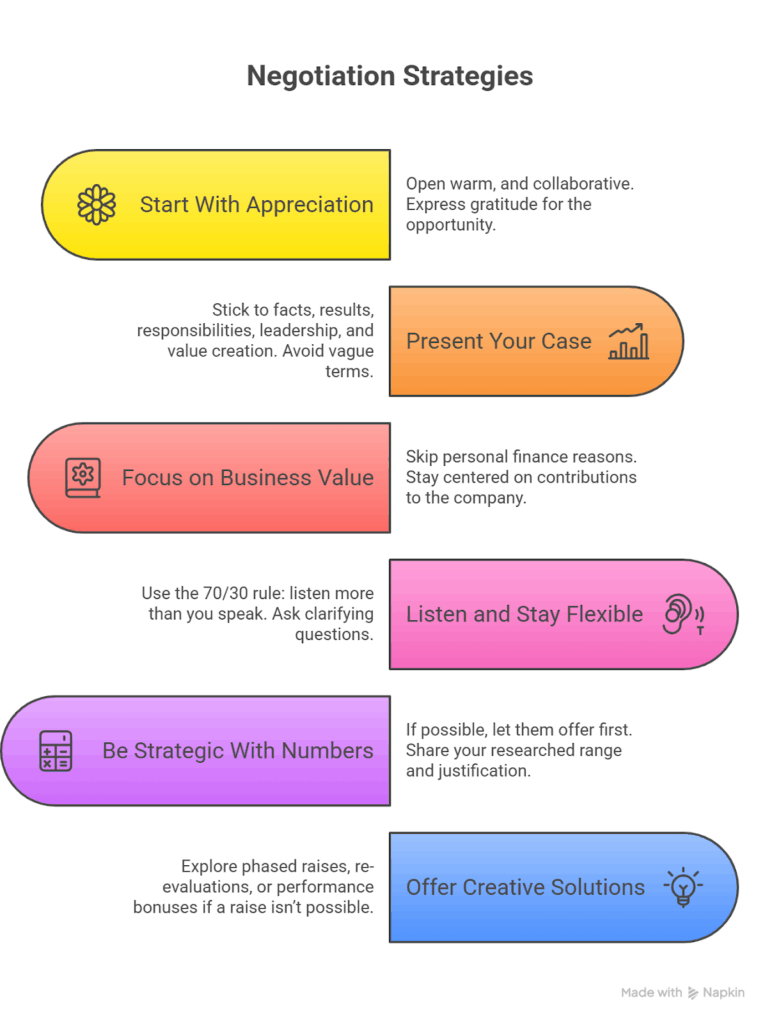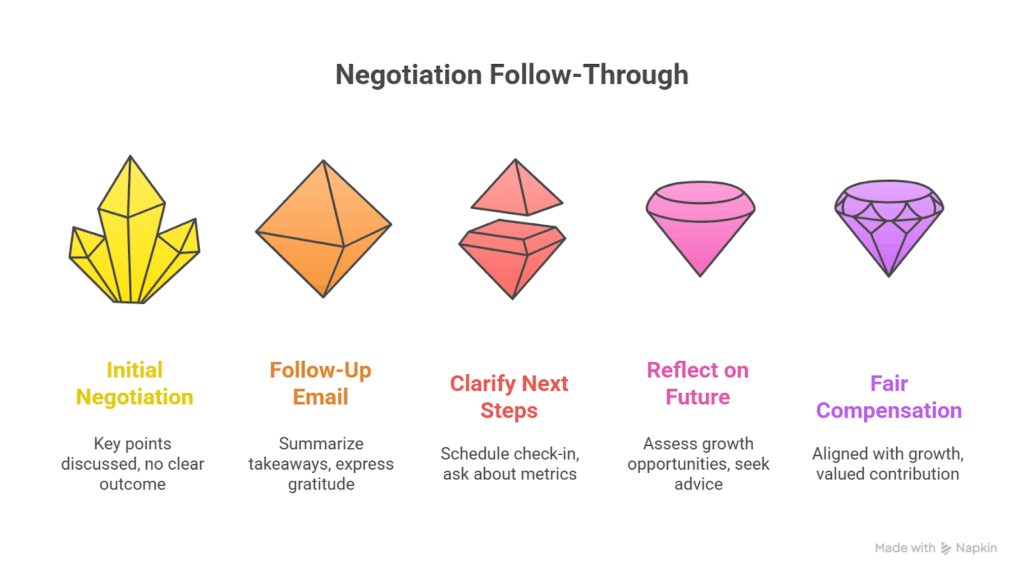

How To Negotiate a Raise as a Mid-Level Manager
Negotiate your raise like a pro: show measurable impact, back it up with data, lead with confidence, stay strategic, and get the compensation you deserve.

Negotiate your raise like a pro: show measurable impact, back it up with data, lead with confidence, stay strategic, and get the compensation you deserve.
What You’ll Learn in This Blog
By the end of this guide, you’ll learn how to:
You’re not new to leadership anymore. “You’ve led through uncertainty, managed complex projects, and delivered measurable results.
And yet—your compensation still reflects where you were, not who you’ve become.
That’s the tension.
Mid-level managers often carry senior-level responsibilities without the paycheck to match.
You’ve earned more, but asking for it?
That’s the part no one really teaches you.
Here’s the short version: Think of your raise conversation as a strategic briefing. Build your case with clear data, position your ask with confidence, and lead the conversation like you would any other business-critical initiative.
The rest of this blog breaks that process down, step-by-step.
No fluff. No recycled advice.
Just grounded strategy, language that works, and the exact framework to get paid what you’re worth.
Start by writing down the tangible results you’ve created.
Think:
Back each win with a clear, measurable outcome.
“I increased retention by 18% in Q2” holds more weight than “I improved team morale.”
Use tools like Payscale, Glassdoor, or LinkedIn Salary Insights to benchmark your role against industry standards.
Consider factors like location, company size, and your years of experience.
Pro tip: If your compensation is 15–20% below market value for your role, that’s strong justification for a raise.
What’s the number that feels like fair recognition?
Set a realistic range—your ideal figure, and the minimum you’d accept.
Anchor this in data, not guesswork. That’s how you keep the conversation grounded and professional.
If budget constraints block a raise, what else would feel like a win?
Think:
This shows you’re collaborative, not rigid.
Rehearse your opener and key points. Say them out loud.
A calm, clear tone makes all the difference.
You’re not begging — you’re briefing.
Try framing your value like this:
“Since taking over the client portfolio, I’ve grown accounts by 25% and reduced churn by half. I’d love to talk about aligning my compensation with the scope of my role.”

Open warm and collaborative.
For example:
“Thanks for making time—I’ve really enjoyed stepping up this year, and I’m proud of what we’ve accomplished. I’d love to talk through my compensation based on how my role has evolved.”
Stick to facts:
Avoid vague terms— clarity builds confidence.”
Instead of “I’ve worked really hard,” say, “I led a six-month initiative that brought in $1.2M in new revenue.”
Skip personal finance reasons like student loans or rent.
Stay centered on contributions to the company.
Use the 70/30 rule: speak 30% of the time, listen 70%. Let your manager respond fully. Ask questions like:
If possible, let them offer first. But if pressed, share your researched range—and why. Say:
“Based on my market research and the expanded scope of my role, I was expecting something in the range of $X to $Y.”
Leave room for a counter.
If the raise isn’t in the budget:

Avoid these missteps:
Summarize key takeaways and express appreciation. Example:
“Thanks again for the thoughtful conversation today. I appreciate your time and feedback, and I’m excited to continue growing in my role.”
If you didn’t get a clear answer:
If the answer was no — and there’s no path forward — it’s fair to consider whether the company still aligns with your growth.
Quietly assess other opportunities or seek guidance from a trusted advisor.
You deserve to be compensated fairly. fairly. And if it’s not possible there, it might be possible somewhere that values you more.

Negotiation isn’t just about money—it’s a leadership skill.
Learning salary negotiation tips for managers is part of stepping into more influence, more responsibility, and more ownership of your path.
REMEMBER: No matter how this conversation unfolds, it’s a signal to yourself: I value what I bring to the table.
Want to feel truly ready before you walk into that room?
FutureStreet Careers exists for moments exactly like this. Strategic prep, clarity coaching, and hands-on support—so you don’t just show up. You show up strong. Meet your private career advisor
Book Now!
And if you’d like support navigating what’s next, we’re here.
Explore professional growth strategies with private career coaching — no templates, just clarity.
You’ve got this—and we’ve got you.
Not if you’re significantly underpaid or your role has grown dramatically. Back it up with data and outcomes.
Be prepared. Know your worth, and state your case clearly and respectfully.
It’s average. If your performance exceeds expectations, aim for more.
A new title and more responsibility—with no pay bump. If that’s you, you’ve got leverage.
Short answer: no. Long answer: only if you’re truly ready—and even then, it’s better to move quietly and professionally.
Ask for feedback, set performance goals, and request a follow-up review.
Let them go first if possible. If not, share a researched range, not a single figure.
Raises build long-term comp. Bonuses are one-time. Ideally: ask for both.


